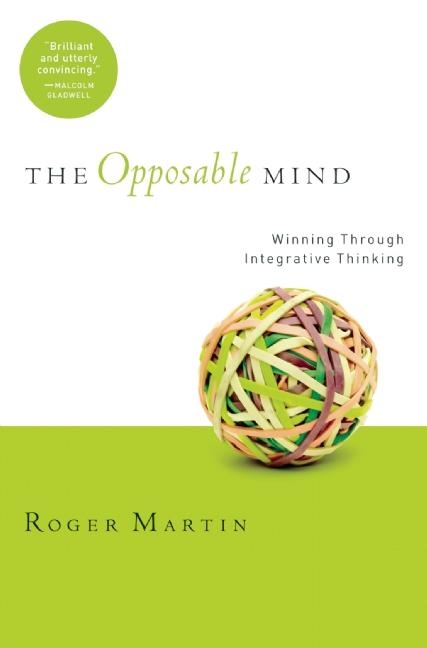Jack Covert Selects - The Opposable Mind
December 14, 2007
The Opposable Mind: How Successful Leaders Win Through Integrative Thinking by Roger Martin, Harvard Business School Press, 224 pages, $26. 95, Hardcover, December 2007, ISBN 9781422118924 Most leadership books teach readers how to become a better strategist or a successful manager or how to get things done. "In recent years, the dominant question addressed for the would-be leader is 'What should I do?
The Opposable Mind: How Successful Leaders Win Through Integrative Thinking by Roger Martin, Harvard Business School Press, 224 pages, $26.95, Hardcover, December 2007, ISBN 9781422118924
Most leadership books teach readers how to become a better strategist or a successful manager or how to get things done. "In recent years, the dominant question addressed for the would-be leader is 'What should I do?' rather than 'What should I think?'" The latter question is what Roger Martin answers in The Opposable Mind.
Martin interviewed a variety of business leaders--including the founder of Four Seasons Hotels Isadore Sharp, Procter and Gamble's CEO A. G. Lafley, co-founder of Red Hat Inc. Bob Young, and Meg Whitman, of eBay fame. He found that their one common skill was being able to employ integrative thinking. That is, they have the "ability to face constructively the tension of opposing ideas and, instead of choosing one at the expense of the other, generate a creative resolution of the tension in the form of a new idea that contains elements of the opposing ideas but is superior to each."
Take Taddy Blecher, co-founder of CIDA City Campus who ventured to educate young black people in post-apartheid South Africa. With a university education priced at $5,000 a year, most South Africans couldn't afford the higher education necessary to pursue new opportunities. Nor could the government financially support enough young people's education to make a difference. Blecher sought a third model by building a university that is "completely self-sustaining and self-generating because it's generating its own economic activity." Beyond attending classes, students at CIDA are responsible for running the university, including maintenance and paperwork. This keeps costs down and enables students to apply their knowledge. Blecher's ability to use integrative thinking to create a new educational model has given thousands of South African youth access to an extraordinary higher education.
By becoming integrative thinkers, Martin explains, we can "hold two conflicting ideas in constructive tension. We can use that tension to think our way through to a new and superior idea." By utilizing this skill in everyday decisions, we can ultimately find more successful and creative solutions to the issues that face our businesses.


